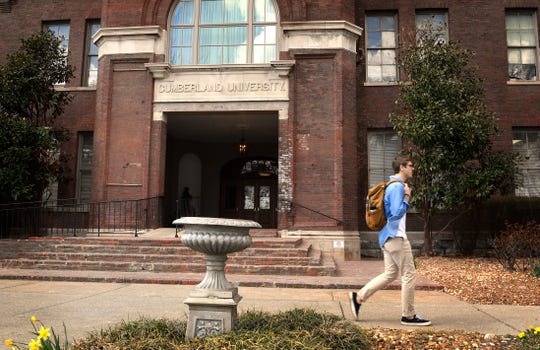Pellissippi State, Cumberland University saw higher enrollment, degree completion with Tennessee Promise
Pellissippi State Community College and Cumberland University saw higher enrollment and degree completion since Tennessee Promise was launched four years ago, according to a new study.
Tennessee Promise is a last-dollar scholarship and mentoring program that gives high school graduates five consecutive semesters of free tuition at an eligible Tennessee community or technical college. The program was launched in fall 2015.
The reports, done by the University of Tennessee-Knoxville’s Postsecondary Education Research Center, are the first two in a series of reports that are looking at the impact of Tennessee Promise at specific higher education institutions in Tennessee.
Interim President Randy Boyd, who previously served as Gov. Bill Haslam’s adviser for higher education and helped create the Tennessee Promise program, said the program has helped to change how Tennesseans think about education.
“Because of Tennessee Promise, because of UT Promise, those programs, we’re beginning to change the culture,” Boyd said. “We’re beginning to have a state where students can be born in a family in a state where they can believe in the future because they’re going to have the opportunity to go on and get a higher education and have a more successful life.”
Pellissippi State saw increased minority enrollment
Pellissippi State Community College, the largest community college in Tennessee, had a 25% increase in first-time, full-time freshman enrollment during the first semester of Tennessee Promise. Additionally, first-time, full-time freshman enrollment had increased by 40% by the fall 2018 semester.
“The study shows that Tennessee Promise both increases accessibility to college and provides incentive for more students to stay the course. At Pellissippi State we are happy to play a role in helping a larger group of Tennesseans earn a post-secondary credential,” said PSCC interim Vice President of Academic Affairs Kathryn Byrd.
Since Tennessee Promise launched, Pellissippi State also saw an increase in the number of African American and Hispanic students enrolled.
Pellissippi State Community College, the largest community college in Tennessee, had a 25% increase in first-time, full-time freshman enrollment during the first semester of Tennessee Promise. (Photo: Michael Patrick/News Sentinel)
The number of African American students grew from 5% in the fall 2015 freshman cohort to 6.4% in fall 2018. Hispanic student enrollment grew from 4.4% in the fall 2015 freshman cohort to 5.9% in fall 2018.
In total, Pellissippi State had 10,894 students enrolled for the fall 2018 semester.
Cumberland University
At Cumberland University, a private university in Lebanon, Tennessee, the number of students enrolled in Tennessee Promise grew from 68 in 2015, when the program started, to 414 in the fall of 2018. Cumberland University has 2,405 students enrolled, according to the school’s website.
“Among the first cohort of Tennessee Promise students at Cumberland University, 44.9 percent completed their associate’s degree in the first five semesters, compared to 23.6 percent across the state,” according to a news release from UT.
Cumberland University President Paul Stumb said the school’s focus on retention has helped drive students to complete their degrees, including a free tutoring program and student retention center.
“Our faculty and staff are devoted to keeping these students in school and getting them to the goal,” Stumb said.
Cumberland University also retained a higher percentage of Tennessee Promise students each semester than statewide averages.

Jackson Decote chose Cumberland University in Lebanon because it is one of the few four-year institutions that accepts Tennessee Promise students. (Photo: Larry McCormack / The Tennessean)
Like at Pellissippi State Community College, the number of minority students at Cumberland University also increased under Tennessee Promise.
Enrollment of Hispanic students grew from 1.5% to 5.6%, African American students grew from 4.4% to 5.1%, and Native American and Asian student enrollment grew from less than 1% each to 1.7% and 1.2%, respectively.
In total, over 1,000 Tennessee Promise students have attended Cumberland University. Stumb said the Tennessee Promise students “are bringing a lot of life to our campus.”
“Our mission is to change the lives and transform lives of young students, and this has allowed us to do that for students who otherwise might not have the opportunity to go to college,” Stumb said. “They certainly would not have had the opportunity to go to a four-year college like Cumberland without the Tennessee Promise.”
Tennessee Promise students take more credit hours
The study also found that students enrolled in Tennessee Promise take more credit hours in their first semester and are more likely to complete their degree or certificate than students not enrolled in the program.
In the first group of first-time, full-time students, 23% completed their program in five semesters. Of students not enrolled in Tennessee Promise, 7.6% completed their program in the same time period.

Interim UT System President Randy Boyd speaks at a news conference about Tennessee Promise on April 2, 2019. (Photo: Monica Kast/News Sentinel)
Students in the first Tennessee Promise cohort had a three-year completion rate of 30.1%, whereas the year before the program started, the three-year completion rate was 23.5%.
UT Promise to launch fall 2020
Last month, UT announced it will launch a last-dollar scholarship program similar to Tennessee Promise that will allow students to attend a UT school free of tuition and fees.
University of Tennessee Promise: What students need to know to get free college
The program, called UT Promise, will launch in fall 2020 and will cover tuition and fees for Tennessee high school graduates with a household income of less than $50,000 a year and who are recipients of the state’s HOPE scholarship.
UT Promise will be available for undergraduate programs at the UT Knoxville, Chattanooga or Martin campuses.
[Read more at Knox News]


